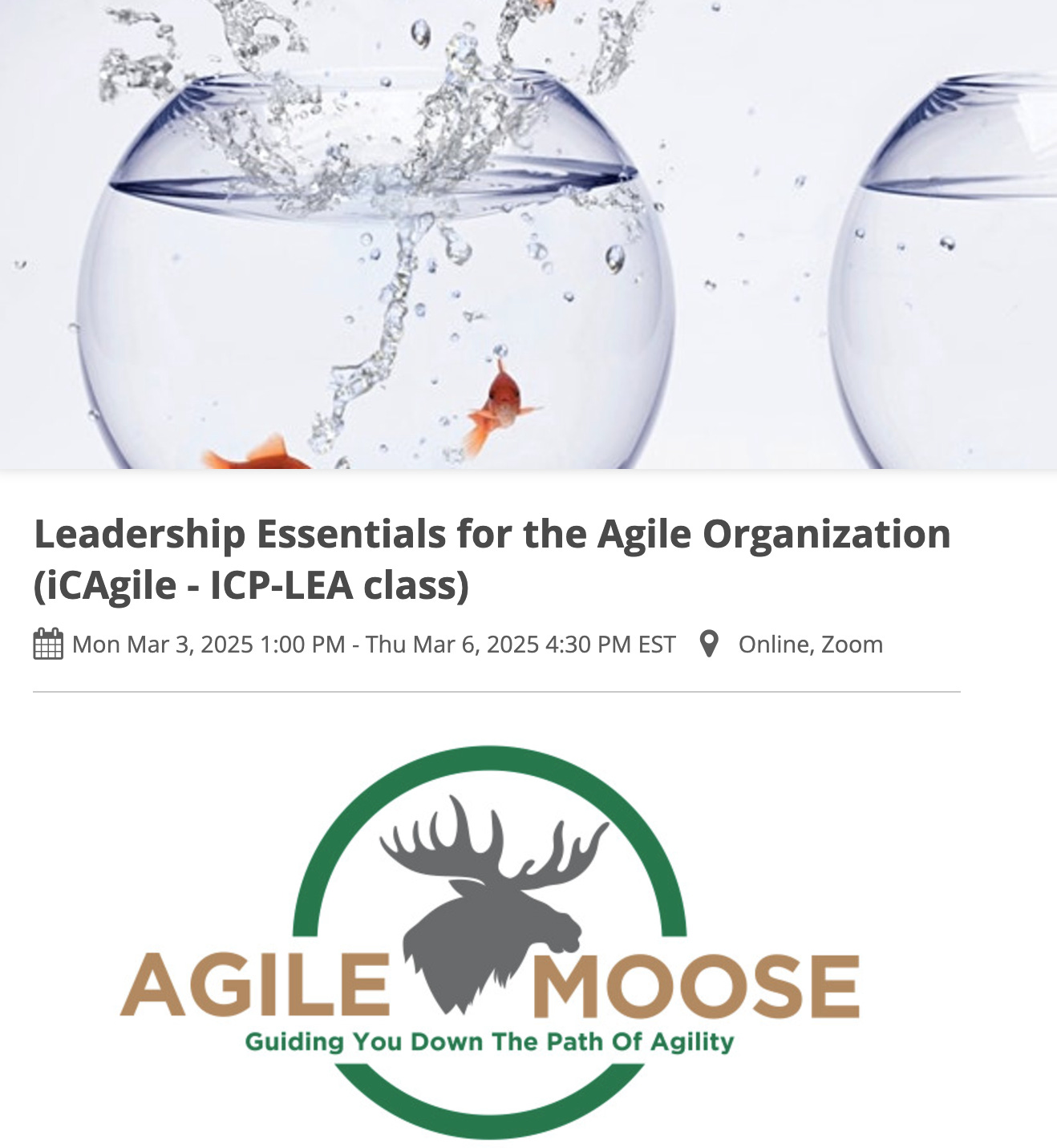The other day, I saw a post from Michael Spayd that grabbed my attention. Michael is someone whom I have incredible respect for because of his many contributions to our agile community. The post highlighted an idea put forward by Padgett Rowell.
Here’s Michael’s post—
Catalyzed by something Padgett Rowell shared with me (not yet published),
I decided to do an AI search on "new ways of leading". It gave me 10 ways (unranked):1. Adaptive Leadership
2. Servant Leadership
3. Transformational Leadership
4. Digital Leadership
5. Inclusive Leadership
6. Empathetic Leadership
7. Sustainable Leadership
8. Distributed Leadership
9. Mindful Leadership
10. Agile Leadership
Yup. Kinda like doing an analysis of The Leadership Circle's Outcome Creating competencies -- ALL those competencies, it turns out, are fully aligned with Agile values!
Looking at the list above, I ask you: which of those is NOT something that has been taught in Agile coaching classes since, oh, 2001 or so? You, Agile coaches, even if you can't find many jobs with that exact job title, consider that you are better trained than most any manager in your company.
It's almost an unfair competition. You are, indeed, the leader of the future.
My Take
I’m torn.
On the one hand, I wholeheartedly agree with Michael. From a management and leadership soft skills or academic knowledge perspective, Agile Coaches are excellent candidates for management and leadership roles. I can clearly see his point. Consider the remainder of this post a (yes, and) to Michael’s thoughts.
But on the other hand, I'm afraid I must disagree with him.
You'd be a terrible candidate for leadership if you’re an Agile Coach without strong technical and business domain skills or only academic knowledge, even if you had many professional coaching certification letters after your name.
This is the same thinking that’s gotten us into trouble in Scrum Master and Agile Coach roles—thinking that a Life or Professional Coach or simply having certifications enables you to step in, make sense of, and operate in a technical domain role.
They can’t.
We must all stop creating the façade that Agile Coaching can be a platform for other roles without deep domain practitioner experience. We’re implying that it’s like a Swiss army knife, and it’s not.
Another Take
I saw another post by Christopher Vestal that relates to this discussion. I thought I’d include it entirely—
Continuing with the conversation of hashtag#NoSuchThingAsAnAgileCoach...
If an Agile Coach cannot be an advisor or mentor (both require domain knowledge) then what value do they add in those moments when no one else has the answer, other than to ask the coachee(s), "well, what are you going to do about it?"
While a powerful question, and perhaps a very helpful prompt to maintain the coachee(s)'s ownership of the challenge, that isn't a reflection of a "team mate", and being part of the team is the context of most coaching that happens within Agile.
Our center of value has been "off" for some time. The "lean times" didn't cause it, but merely exposed and made it obvious. When I ask "has our center of value changed?" ironically, that is a coaching question.
Perhaps (and I am just spit-balling here...) our value could be found in having deep domain experience with higher than average dynamic range from "doing it and helping others do it". (You know... from all those times prior of wrestling with difficulties and actually being agile within contexts similar to what the team is encountering in the moment...)
Experience that has a harvest of wisdom should be embraced, not diminished or marginalized. We need much more - not less. I would think this would be obvious, in spite of the paradox which requires the balancing of "not telling them too quickly".
I’d also encourage you to read the comment stream on this post. It’s pretty interesting!
Wrapping Up
We must begin measuring the competency and effectiveness of Agile Coaches not just by their coaching skills but by their technical domain skills and experience. In this, I would include—
Software Design and Architectural skills
Business Analysis, Software QA, and DevOps skills
Project Management skills
Organizational Development skills
Direct leadership experience
Business & Product domain skills
Strategic planning and execution skills
Organizational Design skills
Decision Making and Accountability skills
Situational Leadership skills
If I interview an Agile Coach with many of the above skills AND coaching skills, that’s an incredibly successful combination. A combination that can lead and deliver business value.
But how many of those are in the world?
Stay agile, my friends,
Bob.
#AgileCoachesNeedDeepDomainSkills
This historical article might provide some additional insights – https://www.agile-moose.com/blog/2023/12/29/agile-coachesdoes-the-direction-of-your-journey-matter






Thanks for the links to those conversations.